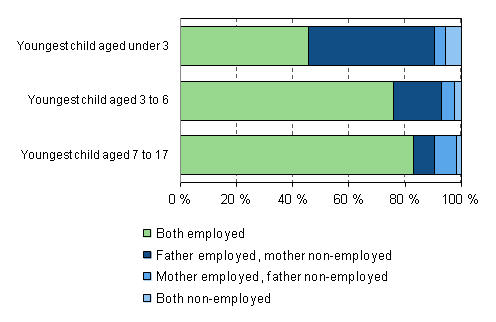5. Both parents of families with children are usually employed
Both the father and the mother were employed in 70 per cent of the two-carer families with children in 2011. When the children are small, the father usually works and the mother stays at home caring for the children. However, this arrangement lasts for a relatively short time period and the so-called dual-earner model becomes usual when the youngest child grows older. When the youngest child is three to six years old, in 76 per cent of the two-parent families, both parents are employed and this was so for as many as 83 per cent of the parents of school-age children. (Figure 10).Figure 10. Labour market position of parents in families with children with two carers aged 20 to 59 by age of youngest child in 2011

In four out of five of the two-parent families where the youngest child was aged under one the father was working and the mother was either on family leave or otherwise caring for children at home. When the youngest child was one to two years old, in every second family the mother had returned to work and only around one third of the mothers were on family leave or otherwise caring for children at home.
Thus, in respect of the parents’ participation in working life the set-up is still very traditional in the majority of families with small children. The mother was working while the father cared for the children in four per cent of the families with children aged under three in 2011.
Source: Labour Force Survey 2011. Statistics Finland
Inquiries: Heidi Melasniemi-Uutela 09 1734 2523, Tarja Nieminen 09 1734 3561, tyovoimatutkimus@stat.fi
Director in charge: Riitta Harala
Updated 11.9.2012
Official Statistics of Finland (OSF):
Labour force survey [e-publication].
ISSN=1798-7857. Families and work in 2011 2011,
5. Both parents of families with children are usually employed
. Helsinki: Statistics Finland [referred: 2.3.2026].
Access method: http://stat.fi/til/tyti/2011/14/tyti_2011_14_2012-09-11_kat_005_en.html

